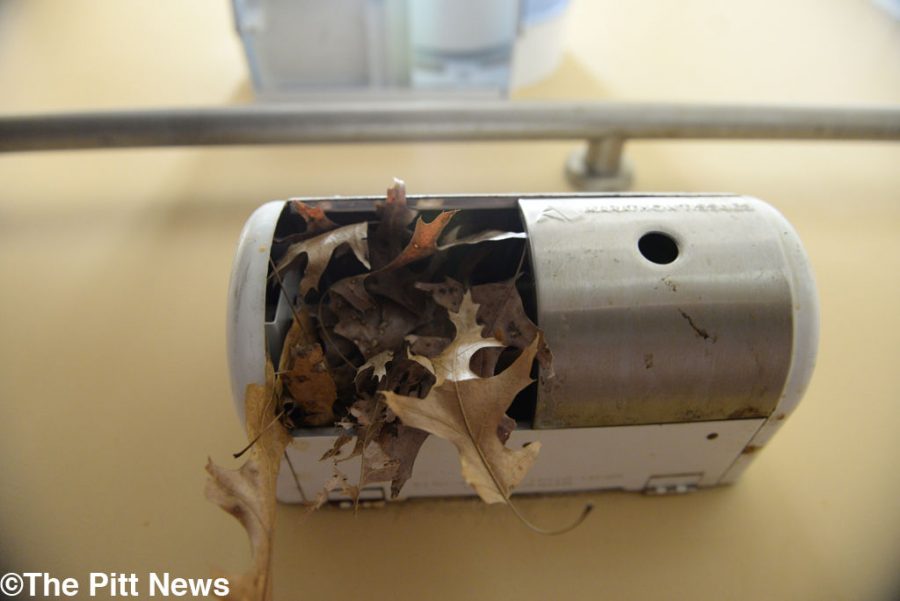Green is the new brown: Pitt to eliminate toilet paper
April 1, 2015
Editor’s Note: This story is satirical.
Student Government Board, along with student groups, plan to wipe away the most ruthless enemy of Mother Nature: toilet paper.
At Tuesday night’s SGB public meeting, three environmental organizations said they plan to regulate the amount of toilet paper students can use on University property.
The clubs, which include Free the Planet, Students for Sustainability and the Real Food Coalition, said the removal of toilet paper from campus bathrooms will significantly reduce the amount of paper waste at Pitt.
Ken Arble, president of Free the Planet, said Pitt’s largest obstacle in the way of becoming a more sustainable campus is the excess use of the biodegradable product.
“We’re doing great on recycling and limiting the use of bags and stuff like that, but our amount of paper waste is just absurd,” Arble said. “We figured cutting back toilet paper was the next logical step.”
The system would allow students an allotted amount of toilet paper squares per semester. Once students exceed the amount, which has yet to be determined, they could either provide their own reusable method or purchase more squares at an increased cost from the University.
A system for tracking an individual student’s use has not been determined. Arble said he and the other green-centric student groups have considered student tracking devices.
The alternative to eliminating toilet paper was reducing the number of pages students could print each semester, but Arble said that would be unreasonable, and “students would never go for it.”
“No student is going to want to give up their precious 900 pages. I know I wouldn’t make it through the semester without it, but I could survive without so much toilet paper,” Arble said.
The groups recognize the hygienic need for toilet paper but have come up with a few alternative sources, such as leaves and bark — which will “allow students to return to the roots of our ancestors,” Arble said — and reusable handkerchiefs.
“The [Bring Your Own Bag Initiative] was so wildly successful we thought we’d try the same concept to fix a different issue,” Collette Pearson, president of Students for Sustainability, said. “I have high hopes for it.”
Jess McDonald, a Pitt alum and one of the founders of the Real Food Corporation, said she was thrilled after hearing about the new movement and re-enrolled at Pitt as a graduate student for the fall to show her support.
“It’s a great opportunity for Pitt to show how sustainable we are. Pitt is a leader in both academics and sustainability,” McDonald said. “We’d be the first school in the ACC to start such a movement. We’re setting the bar pretty high.”
McDonald said the groups are looking into a tangential movement limiting the number of times students can flush the toilet each week, but talks with the University are in preliminary stages.
Although SGB is on board, the general student population still seems skeptical.
Lance Hardwood, a sophomore majoring in philosophy, said he doesn’t think he could adjust to such a system.
“I don’t see how I could get used to limiting my use of toilet paper,” Hardwood said. “I have a technique that shouldn’t be disrupted.”
Regina Falange, a junior majoring in urban studies, agrees that the new system may not be ideal.
“What I do in the bathroom is my business. I shouldn’t have regulations put on what I can or can’t do, or use, in there,” Falange said.
The environmental groups are prepared for criticism, but said that students will eventually warm up to the idea after seeing statistics demonstrating tangible results.
“It will take some getting used to, but I think once students see the results they’ll be very happy they took part in such a project,” Pearson said. “Pitt might get a bit smelly, but I’m confident we will quickly see a streak of results.”








